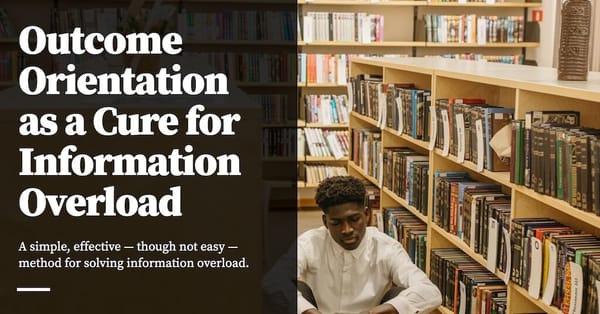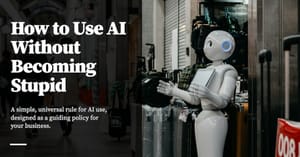I no longer suffer from information overload.
This is a little bizarre to say. I’ve not cut down on tools, nor have I bought new software. My workflows — whilst somewhat under-optimised (can they ever be truly ‘perfectly optimised’?) — are still mostly the same.
The solution to my problems comes not from tool-use but from a new, internal stance. I learnt this from Dinesh Raju, who taught me this sometime in August last year. The technique originates from investing — it is fairly common to hear investment professionals say “curate your information sources”; I used to think this meant ‘keep a good, well filtered information diet’. I now realise this is mistaken — investors have to consume large amounts of information as part of their job; there is no way a ‘strict diet’ approach would work for them. ‘Outcome Orientation’ is a more accurate description of what they do.
I’ve been meaning to turn it into an essay for some time now, but wanted to put it to the test first — in true Commoncog fashion. But in truth, I’ve been convinced for a long time. I wrote up a quick set of notes in the Commoncog members forum in November 2024, four months into the practice, and it was already working for me then. I’ve been living in a completely different information environment ever since.
Here’s how that internal stance works. We shall call it ‘Outcome Orientation’. Outcome Orientation is very simple. At all times, whenever you are doing something or reading something, you should ask yourself the question:
“What is the outcome I am trying to achieve here?”
You may then continue with the action or consumption if you wish, but you must answer the question honestly first.
That’s it. The point is not to control your time allocation, the point is to always be aware of why you are consuming something as you are consuming it. If you do this, you will automatically change your time allocation as a result.
This seems stupidly simple, but it’s actually really hard to do. This is one of those Charlie Munger-type “take a simple idea and take it very seriously” ideas, which belongs on the same shelf as “eat healthy and exercise a lot” — deceptively simple on the surface, difficult to do because it demands discipline, but if you actually take it seriously and put it to practice … you will change your life.
Here are some (simpler) examples of Outcome Orientation in action:
- I am listening to a podcast while doing house chores and 15 minutes in, I ask myself “what is the outcome I am trying to achieve here?” The answer is: nothing, the one morsel of information that I wanted from the podcast I got at the 10 minute mark, and it appears it’s all downhill from there. So I stop, and proceed to do the rest of my chores in silence.
- My friends discuss the Olympic boxing gender controversy, and I find myself reading up on the topic. I ask myself “what is the outcome I want here?” And my answer is that I am doing it for phatic reasons. There is no relevance to my life or to my work; I’m just doing it because my friends are talking about it in the group chat and I want to be part of the conversation. I carry on, but I am now aware of the real reason I am doing this thing, and stop before it consumes my entire afternoon.
- I see someone say something very stupid on Twitter. I type out a snarky reply and then ask myself “what is the outcome I want to achieve here?” I admit that I just want to make myself feel good. So I delete the reply.
- I find myself scrolling Twitter mindlessly at the end of a long day. I open the compose box. Before I post, I ask myself: “what is the outcome I am trying to achieve here?” The answer is “I am tweeting because I am bored and want to get some attention/engagement." This is ok, actually: under the rules of Outcome Orientation, I can carry on so long as I am honest with myself about the true reason for doing something. However, I admit that this is a bit lousy as a reason, and I have higher quality fun things I can do, and so I stop.
- I am watching a Jon Stewart video making fun of Trump. It’s just ok, not his best work. At the halfway mark I ask myself “what is the outcome I want here?” And the answer is entertainment. But there are purer forms of entertainment where I don’t have to engage my brain. So I stop and watch an episode of Xmen ’97 instead.
The results are wonderful. Over the past six months my mind feels less like a crowded library, and more like a clean, open field with plenty of space to think. I am quietly confident that I can focus on things that I truly care about. And, most importantly, I feel empowered: I know I have complete agency over how I direct my attention, and I am secure in the knowledge that nobody can take that away from me.
As a result, increasingly it feels like folks around me are losing their minds over the latest political fiasco or hot topic du jour, whereas I pay the minimum necessary attention to the articles, podcasts or videos shared by friends, extract what is important for my outcomes, and then move on.
More Powerful Than Having an Information Diet
Lots of folks I know think that a good solution to information overload is to implement what is commonly called an ‘information diet’ — that is, you filter your information sources (e.g. delete TikTok!) and prune your social media feeds (mute certain accounts on Twitter!) so that you control what you consume. To be clear, this is a reasonable approach, and results in good outcomes. It was what I used to do before I learnt this approach.
But Outcome Orientation is more powerful, in just about every way. I currently think of Outcome Orientation as level three on a three-tier hierarchy of information consumption:
- Level One (No Filters): You let everything in indiscriminately.
- Level Two (Strong Filters): You build shields: you mute or block information sources that are not reliable, so that you can consume everything on your pre-curated lists with a relaxed epistemic stance.
- Level Three (Outcome Orientation): You wear a hazmat suit and venture out into the radiation wastelands that is the Internet for very specific goals.
Why is this more powerful than an information diet? The answer is that it is more flexible. It also allows you to do things that a strict information diet does not allow you to do.
Here is an example. If you invest in crypto protocols, like I do, it is important to follow all the actors around a project. You don’t want to just read the formal proposals on their Discourse forums; you want to follow the principals on Twitter and get a sense of their mental states, mark the wallets which hold the most tokens, and check the cross chatter for behind-the-scenes work leading up to some formal governance proposal.
You also want to keep a running tally of who is a scammer and who is not.
This requires you to spend a lot of time on CT (Crypto Twitter), which is a cesspit of scammers and emotionally compromised, slightly mentally unstable individuals. If you only use Level Two (strong filters) you will not be able to sift through the dreck in order to find signal, since you will filter out everyone that is untrustworthy. You need a slightly more advanced information consumption strategy in order to do that. Hence: Outcome Orientation.
After putting this to practice, I find it possible to say, read a fight between a cat and a cryptopunk account on Twitter, and file away the information as “ok, this subculture is not pleased with this project”. Or I follow an account with a collection of coconut trees as their profile picture talking about the macro environment. I find myself better equipped to sift through narratives to identify cabals and trends.
Of course, at some point there might be diminishing returns to following CT, in which case there is more information to be gained from looking at market data, or onchain data. So Outcome Orientation also leads you to switch information sources, since you are constantly asking yourself “am I accomplishing my outcome?” as you are consuming.
This example may be a little specific, but the technique is generally useful whenever you need to widen the aperture to sample more ... adversarial information sources. It enables you to treat ideologically-compromised commentators, unhinged, grandstanding, low believability founders, or motivated state-level actors in the same way: as sources to harvest intelligence. (Of course the information value of these sources may differ according to context, but the point is that you may now include them, whereas at Level 2 you would have to remove them for consideration in your information ‘diet’.)
This is all very difficult, since you’re building a mental muscle you’ve never used before. But the big thing that has fallen out of this is that I no longer suffer from information indigestion. I am perfectly ok with a pile of unlistened podcasts, or unread articles in my Readwise Reader. (“What is the outcome I want to achieve here?” I ask myself. “Nothing” I answer, as I delete the episode or archive the article).
More Advanced Examples
Here are some slightly more advanced examples, including examples where I’ve failed:
- I found myself following the Wordpress drama a little too obsessively. At some point I asked myself “what is the outcome I want to achieve here?” The answer is that I want to collect a new case study of a (what seems to me like) a new open source business model failure mode. I have considered starting an OSS company many times in the past. As a result of this outcome audit, I stopped following the insult-hurling on Twitter so closely, and refocused my attention on the court filings + the major decisions. (I am also cheating here, because my friend Lesley is very plugged into the WP ecosystem, and will alert me to major developments)
- Someone tagged me in a LinkedIn post about Statistical Process Control for revenue ops, and I found it very badly written. I also suspected that it was ChatGPT generated (due to the use of ‘delved’, and the milquetoast description of the technique). I left a comment pointing out that it is likely AI generated. The author responded with “you can prompt GPT to output sentences with this variance, formatting, use of embedded quotes? Dang, be a pal and share that prompt.” My goal when commenting was to plant the idea that this article was low quality. My goal was accomplished; I did not respond.
- Whenever I write a tweet thread, I now ask myself “what is the outcome I want to achieve with this thread?” Every thread must have an outcome before I start writing. Most will link to some Commoncog or Xmrit content. For instance, my viral ‘founder mode’ criticism thread was designed to link to Commoncog’s case sequence on capital allocators. (But, in all honesty, I was also emotionally compromised when writing it).
- I saw two tweets comparing SF + Bay Area innovation to Singapore’s (lack of) innovation. There was no benefit to be had from engaging. I failed.
I think one advanced form of Outcome Orientation is something that Visakan Veerasamy espouses, which comes from the same source (Dinesh is a mentor to both Visa and me):
a thing that took me 5+ years to learn, maybe closer to 10 years – and I resisted it for a long time – is something very foundational about attention sovereignty.
— Visakan Veerasamy (@visakanv) July 31, 2023
basically you begin with the premise that your attention is extremely valuable and you allocate it like a VIP
Outcome Orientation is also powerful when expressed as a focusing mechanism for creating or materialising what you want. The way Visa puts this is “focus on what you want to see more of”:
I think it’s worth spending maybe 1-5% of one’s time occasionally lightly gesturing at the state of things… but the core winning move, the fundamental posture, is to focus on what you want to see more of https://t.co/eY7LIDpCXl
— Visakan Veerasamy (@visakanv) July 31, 2023
Both of these tweet threads are the result of “taking this simple idea and taking it very very seriously.” Visa seems to have internalised this idea earlier and for far longer than I have. It is likely why he has been so prolific on Twitter: why his content is so generative, why he has such good reply game, and why he isn’t as psychologically affected by the shenanigans or fights on the platform. (“Twitter is an extreme sport, and it’s not for everyone”, he once said to me, and I thought I understood then but I clearly didn’t.) There are likely other, adjacent nuances that I’ve yet to uncover, and I can’t wait to find out what those are.
Outcome Orientation has been transformative to me. I hope it is for you as well. I hope it helps you become a more effective human.
Originally published , last updated .
This article is part of the Expertise Acceleration topic cluster. Read more from this topic here→





